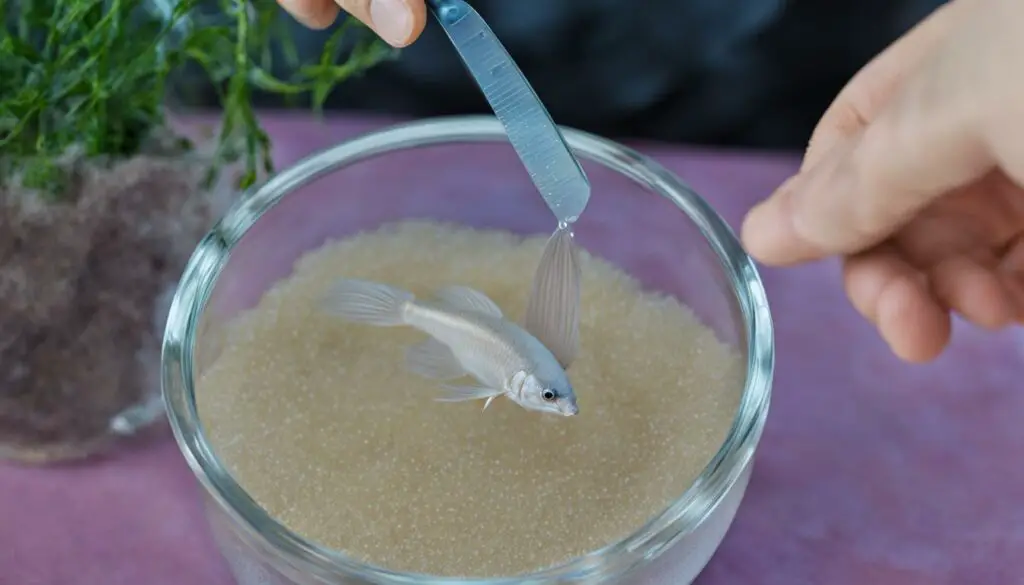Last Updated on 2 years by admin
As a betta fish owner, you want to ensure your pet has the best possible care to live a long and healthy life. One way to do this is by incorporating epsom salt into their care routine. Epsom salt has numerous benefits for betta fish, and in this comprehensive guide, we will explore those benefits and provide step-by-step instructions on how to use it to improve your pet’s health and vibrancy.
Key Takeaways:
- Epsom salt can be highly beneficial for improving the health and vibrancy of betta fish.
- Proper dosing and administration of epsom salt is crucial to ensure the well-being of your pet.
- Epsom salt can be used as a treatment for various common ailments that betta fish may experience.
- It is important to closely monitor your betta fish during and after epsom salt treatment for any signs of improvement or potential side effects.
- Epsom salt is just one tool in promoting the health and well-being of your betta fish, and there are other care practices and alternative treatments to consider.
Understanding the Benefits of Epsom Salt for Betta Fish
Epsom salt, also known as magnesium sulfate, has several benefits for betta fish when used in the appropriate dosage. It contains magnesium and sulfate, which can help regulate osmosis and improve the functioning of the fish’s internal systems.
The properties of epsom salt can also reduce inflammation, promote healing of wounds, and improve the overall health and vibrancy of betta fish.
An epsom salt bath can also help relieve constipation and bloating, which are common health concerns in betta fish.
Reducing Stress
Betta fish can experience stress due to factors such as poor water quality, overcrowding, or changes in their environment. Epsom salt can help reduce stress by promoting relaxation and maintaining a healthy balance of electrolytes in the fish’s body.
It is important to note that while epsom salt can be beneficial for betta fish, it should be used in moderation and under the guidance of a veterinarian or experienced fish keeper.
Next, we will discuss the importance of incorporating epsom salt into your betta fish care routine.

The Importance of Betta Fish Care with Epsom Salt
If you own a betta fish, you know how important it is to take good care of them. Incorporating epsom salt into their care routine can be highly beneficial for their overall health and well-being. Epsom salt, also known as magnesium sulfate, has properties that can help prevent and treat various health issues in betta fish.
When used correctly, epsom salt can help reduce inflammation, promote healing, and boost their immune system. It can also help regulate their metabolism, improve digestion, and provide relief from stress.
However, it’s essential to approach the usage of epsom salt with caution and proper knowledge. Overusing it or administering the wrong dosage can harm your betta fish instead of helping them. Therefore, it is vital to understand the right way to use epsom salt for betta fish care.
Betta Fish Care with Epsom Salt: Prevention and Treatment
Using epsom salt can help prevent and treat various health issues that betta fish may face. Here are some common problems that epsom salt can address:
- Constipation: Betta fish are prone to constipation, which can lead to bloating and swim bladder issues. Epsom salt can act as a laxative and help relieve constipation.
- Fungal and Bacterial Infections: Epsom salt has antimicrobial properties that can help prevent and treat fungal and bacterial infections in betta fish.
- Fin Rot: Fin rot is a bacterial infection that can cause the fins to deteriorate and fall off. Epsom salt can help prevent and treat the condition by promoting healing and reducing inflammation.
While epsom salt can be an effective remedy for these issues, it’s not a cure-all. If your betta fish is experiencing any health problems, it’s crucial to consult a veterinarian to ensure the correct diagnosis and treatment.
Betta Fish Care with Epsom Salt: Dosage and Administration
Determining the right dosage of epsom salt for your betta fish is crucial. The appropriate amount will depend on their size and specific condition. Generally, a dosage of 1 to 3 teaspoons of epsom salt per gallon of water is recommended.
When administering epsom salt, it’s crucial to monitor your betta fish closely. A salt bath can be particularly stressful for them, so it’s essential to keep an eye on their behavior and remove them from the bath if they show signs of distress.
Administering epsom salt treatment should be done for a limited period of time, no more than 10 days, and with water changes every day. It is recommended to repeat the process no more than once a month.
Betta Fish Care with Epsom Salt: Conclusion
Using epsom salt in betta fish care can have numerous benefits when done correctly. It’s essential to understand the appropriate dosage and administration method to ensure its effectiveness and avoid any potential harm. Incorporating epsom salt into your betta fish’s care routine can help promote their health, vitality, and happiness.

Determining the Right Epsom Salt Dosage for Betta Fish
Administering the correct dosage of Epsom salt is crucial to ensure the well-being of your Betta fish. The appropriate amount of Epsom salt to use depends on your fish’s size and specific condition.
The recommended dosage for Epsom salt is 1 teaspoon per gallon of water. However, this may vary depending on the size of your tank and your fish’s condition. If you’re using Epsom salt as a general preventive measure, you can add 1 teaspoon to your Betta’s tank during water changes.
For treating specific conditions, it’s essential to be more precise with the dosage. A more concentrated amount of Epsom salt may be required for severe cases. Here’s a table to help you determine the correct dosage according to your tank size and the desired concentration:
| Tank Size | Teaspoons of Epsom Salt |
|---|---|
| 1 gallon | 1/8 teaspoon |
| 2 gallons | 1/4 teaspoon |
| 3 gallons | 3/8 teaspoon |
| 4 gallons | 1/2 teaspoon |
| 5 gallons | 5/8 teaspoon |
| 10 gallons | 1 1/4 teaspoon |
It’s crucial to remember to dissolve the Epsom salt in a separate container of water before adding it to the tank. Add the dissolved salt slowly over a period of 2-3 hours to avoid shocking your Betta fish.
If you’re unsure about the appropriate dosage for your Betta fish, consult with a veterinarian or an experienced Betta fish owner.

Using Epsom Salt to Treat Betta Fish
Epsom salt can be an effective treatment for various common ailments that betta fish may experience. It is important to note that while epsom salt can be useful, it should not be used as a substitute for veterinary care. If your fish has a severe or persistent health condition, it is best to consult a veterinarian.
Conditions Treated with Epsom Salt
Epsom salt can be used to treat several conditions in betta fish:
| Condition | Symptoms | Treatment |
|---|---|---|
| Bloat | Lethargy, loss of appetite, swollen belly | Administer an epsom salt bath for 10-15 minutes, repeat every 2-3 days until symptoms improve |
| Fungal infections | White, cotton-like growth on fins or body | Add 1 teaspoon of epsom salt per gallon of water in the aquarium, maintain for 3-4 days |
| Constipation | Lack of bowel movements, bloated appearance | Feed your fish a diet high in fiber, administer an epsom salt bath for 10-15 minutes, repeat every other day for up to a week |
It is important to note that epsom salt should not be used to treat all health conditions in betta fish. In some cases, it may even exacerbate the problem. Always research specific conditions and their appropriate treatments before administering any kind of treatment.
Administering Epsom Salt Treatment
When using epsom salt to treat your betta fish, it is important to follow the correct dosage and frequency guidelines. As mentioned in Section 4, the appropriate dosage will depend on your fish’s size and condition.
Administering an epsom salt bath is the most common method of treatment. To do this, you will need to prepare a separate container with 1 teaspoon of epsom salt per gallon of water. Keep in mind that the water should be the same temperature as the aquarium water and should be free of any harmful additives.
Next, transfer your fish to the container and let them soak for 10-15 minutes. Repeat every 2-3 days until symptoms improve.
Tips for Effective Treatment
- Always research appropriate treatments for your fish’s specific condition before administering any kind of treatment.
- Monitor your fish closely during and after treatment to ensure they are responding well.
- Do not use epsom salt as a substitute for veterinary care.

Step-by-Step Guide on Using Epsom Salt for Betta Fish
If you’ve decided to try using epsom salt to improve your betta fish’s health, there are important steps to follow for safe and effective treatment. Here is a step-by-step guide:
Step 1: Prepare the Tank
The first step is to prepare the tank for the epsom salt treatment. Check the water parameters to ensure they are within the appropriate range for betta fish. The pH should be between 6.5 and 7.5, and the temperature between 76°F and 82°F.
It’s important to clean the tank thoroughly to prevent any bacteria or parasites from interfering with the treatment. Remove any uneaten food, debris, and waste from the tank. If necessary, consider doing a water change to improve the water quality.
Finally, acclimate your betta fish to the salt slowly. Gradually add small amounts of epsom salt to the water over a period of several hours to prevent shock.
Step 2: Administer the Epsom Salt Bath
Once the tank is prepared, it’s time to administer the epsom salt bath. Fill a separate container with clean, conditioned water and add the appropriate amount of epsom salt based on your betta fish’s size and condition.
Place your betta fish into the container and let them soak for 15-20 minutes. During the bath, your betta fish may appear stressed or uncomfortable, but this is normal. Keep a close eye on them to prevent any accidents or injuries.
Step 3: Rinse and Monitor
After the bath, rinse your betta fish with clean, conditioned water before returning them to the tank. Monitor your fish closely for any changes in behavior or health. If you notice any negative side effects, consider adjusting the treatment or seeking veterinary assistance.
Step 4: Repeat as Needed
To treat specific conditions, epsom salt baths may need to be repeated several times over the course of a few days. Always follow the recommended dosage and frequency guidelines for your betta fish’s specific condition.
Remember to maintain good betta fish care practices to prevent health issues from arising in the first place. A balanced diet, proper water conditions, and regular tank maintenance are all essential for keeping your betta fish healthy and happy.

Preparing the Tank for Epsom Salt Treatment
Before administering epsom salt treatment, it is essential to prepare the tank properly. The following guidelines will help you create an optimal environment for your betta fish’s recovery:
- Cleanliness: Ensure that the tank is clean and free of any debris or waste. Use a gentle aquarium-safe cleaner to remove any buildup on the tank walls and decorations.
- Water parameters: Epsom salt treatment is most effective in warm water with a pH between 6.8 and 7.5. Betta fish also prefer soft water with a low mineral content, so ensure that the water hardness is below 75 ppm.
- Acclimation: Gradually introduce your betta fish to the salt by adding small amounts over several hours. This will prevent shock and ensure that your fish adjusts well to the new environment.
Remember to carefully monitor the water parameters during epsom salt treatment to ensure that they remain stable. Conduct regular water changes to maintain optimal water quality and health for your betta fish.

Administering an Epsom Salt Bath for Betta Fish
Epsom salt baths can be a highly effective way to treat various health issues in betta fish. Follow these step-by-step instructions to ensure a safe and successful treatment:
- Fill a separate container with clean, dechlorinated water. The water should be at the same temperature as the tank water.
- Add 1 teaspoon of Epsom salt per gallon of water to the container.
- Stir the water to dissolve the salt.
- Gently transfer your betta fish to the container using a net. Ensure they are fully submerged in the Epsom salt bath.
- Set a timer for 10-15 minutes, depending on the severity of the condition being treated.
- After the time has elapsed, carefully transfer your betta fish back to their tank using a net. Do not pour the Epsom salt water from the container into the tank.
Repeat this process every day until the health issue has improved or as directed by a veterinarian. It is best to perform the Epsom salt bath in a separate container rather than in the betta fish’s tank to prevent any excess salt buildup.
It is important to note that while Epsom salt baths can be beneficial, they should not be used as a long-term treatment. If your betta fish is experiencing persistent health issues, consult with a veterinarian for proper diagnosis and treatment.

Monitoring and Observing the Effects of Epsom Salt
After administering epsom salt treatment to your betta fish, it is crucial to monitor them closely to ensure the treatment is effective and safe. Here are some tips on what to look for:
- Behavior: Observe your betta fish for any changes in behavior. If they are more active and lively, it is likely that the treatment is helping their overall health.
- Appetite: Check if your betta fish is eating as usual. If they are not eating or consuming less food, it could be a sign that they are experiencing side effects from the epsom salt treatment.
- Fins: Examine their fins for any signs of improvement. If their fins were clamped or deteriorating prior to the treatment, look for any signs of fin regrowth or an overall improvement in fin health.
- Swelling: If your betta fish had any swelling or bloating prior to the treatment, observe if it has reduced or disappeared.
It is also important to note that while epsom salt can be highly beneficial for betta fish, excessive use or improper dosage can lead to adverse effects. Here are some potential side effects of epsom salt treatment:
- Dehydration due to loss of electrolytes
- Damage to the betta fish’s skin and scales
- Stress and prolonged exposure can weaken the immune system
Keep in mind that not all betta fish will respond the same way to epsom salt treatment, and it may not always be the best solution for their specific health issues. If you notice any adverse effects or the treatment is not improving their condition, it is recommended to consult with a veterinarian.
Testimonial
“I noticed my betta fish was suffering from bloating and a lack of appetite. After some research, I decided to try epsom salt treatment. Within a few days, I noticed a significant improvement in his behavior and appetite. He was swimming more energetically and eagerly eating his food. I am grateful for epsom salt and the positive impact it had on my betta fish’s health.” – Jane, Betta Fish Owner

Tips and Best Practices for Using Epsom Salt
If you’re new to using epsom salt for betta fish care, here are some tips and best practices to help you get started:
- Start with a small dosage: It’s always best to err on the side of caution when administering any new treatment to your fish. Start with a small dosage and gradually increase it if needed.
- Use high-quality epsom salt: Make sure you’re using high-quality epsom salt without any additives or scents. Look for products that are specifically labeled for betta fish care.
- Perform regular water changes: Regular water changes are crucial for maintaining a healthy aquarium environment. Aim to change 20-30% of the water every week.
- Adjust your betta fish’s diet: Epsom salt can help with digestion issues, but it’s still important to feed your betta fish a balanced diet. Check with your veterinarian for recommendations on the best food for your fish.
- Observe your betta fish: Keep a close eye on your betta fish’s behavior and physical appearance. If you notice any abnormalities or changes, consult with your veterinarian right away.
By following these tips and best practices, you can effectively use epsom salt to improve the health and well-being of your betta fish.

Other Considerations and Alternative Treatments
While epsom salt can be a great supplement to betta fish care, it is important to remember that there are other factors to consider when ensuring the overall health of your pet. Here are some additional tips to keep in mind:
- Regular water changes are essential for maintaining a healthy tank environment.
- Pay attention to your betta fish’s diet and provide a varied and balanced meal plan.
- Ensure the temperature and pH levels in the tank are appropriate for your betta fish’s needs.
- Observe your betta fish for any signs of illness or distress and seek veterinary assistance if necessary.
If your betta fish is experiencing a specific health issue, there may be alternative treatments to consider in addition to or instead of epsom salt. For example, aquarium salt or medication may be more effective for certain conditions. Always consult with a veterinarian or experienced fish expert before administering any treatment.
“It’s important to approach betta fish care with a holistic mindset, incorporating various practices and treatments to promote their overall well-being.”
Remember, each betta fish is unique and may require individualized care. By staying informed and attentive to your pet’s needs, you can provide them with the best possible care and ensure their happiness and longevity.

Conclusion
After reading this comprehensive guide on how to use epsom salt for betta fish, you now have the knowledge and tools to promote the health and well-being of your pet. Remember, incorporating epsom salt into your betta fish’s care routine requires proper dosage and preparation of the tank. Close monitoring is necessary during and after treatment to observe signs of improvement and detect any potential side effects.
By following the step-by-step instructions provided in this guide, you can safely and effectively use epsom salt as a remedy for various common ailments that your betta fish may experience. And always remember, while epsom salt can be a valuable tool, there are other factors and alternative treatments to consider for your betta fish’s care.
Tips and Best Practices for Using Epsom Salt for Betta Fish
Maximizing the benefits of epsom salt for your betta fish requires a proper understanding of its properties and the care needed to administer it. Here are some helpful tips and best practices:
- Ensure that the water in the tank is clean and has the appropriate parameters before administering epsom salt treatment.
- Consider adjusting your betta fish’s diet to support overall health and aid in recovery.
- Monitor for any signs of stress or discomfort in your betta fish during and after treatment.
- Perform regular water changes to maintain optimal tank conditions.
By keeping these tips in mind, you can ensure that your betta fish stays healthy and happy, with the help of epsom salt.
Other Considerations and Alternative Treatments
While epsom salt can be highly beneficial for betta fish, there are other factors and alternative treatments to consider. Additional care practices such as regular tank cleanings, proper diet, and temperature regulation should also be incorporated into your betta fish’s routine. If your betta fish requires veterinary attention, do not hesitate to seek the assistance of a professional.
Remember, always prioritize the health and well-being of your betta fish, and use epsom salt treatment as a supplementary tool to promote their vitality.
FAQ
How can epsom salt benefit betta fish?
Epsom salt can provide various benefits for betta fish, including improving their overall health, promoting fin regrowth, and reducing stress and inflammation.
How often should I use epsom salt for betta fish?
The frequency of epsom salt usage depends on the specific condition of your betta fish. It is recommended to consult a veterinarian or follow the instructions provided by a trusted source.
How do I determine the right dosage of epsom salt for my betta fish?
The appropriate dosage of epsom salt depends on the size of your betta fish and their specific condition. It is crucial to accurately measure and administer the correct amount to ensure their well-being.
Can epsom salt be used to treat specific betta fish ailments?
Yes, epsom salt can be used as a treatment for various common ailments in betta fish, such as swim bladder disease, constipation, and fungal infections. However, it is important to use it under proper guidance and consider other treatment options if necessary.
How do I administer an epsom salt bath for my betta fish?
Administering an epsom salt bath requires careful preparation and a specific procedure. It is crucial to follow the guidelines provided by reputable sources to ensure a safe and effective treatment.
What should I observe while using epsom salt for betta fish?
It is important to closely monitor your betta fish during epsom salt treatment for any signs of improvement or potential side effects. Pay attention to their behavior, appetite, and overall well-being.
Are there any tips for using epsom salt for betta fish?
Yes, there are several tips and best practices to enhance the effectiveness of epsom salt treatment. These include maintaining proper water parameters, providing a balanced diet, and ensuring general fish health.
Are there alternative treatments to consider for betta fish care?
While epsom salt can be beneficial, it is important to consider other factors and alternative treatments. Depending on the specific condition of your betta fish, additional care practices or veterinary assistance may be necessary.

